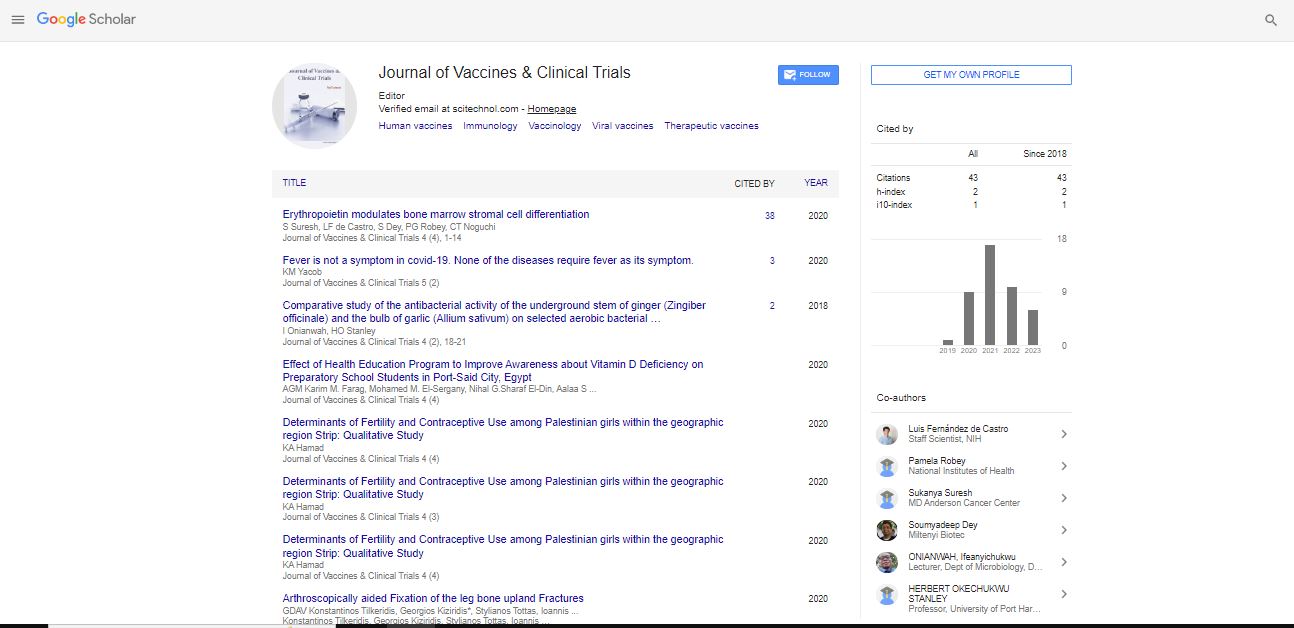Opinion Article, Jou Of Vac Cli Tr Vol: 7 Issue: 2
Duration of Vaccine Protection in the Body for Individuals Aged 60 Years and Older
Silvia Zhou*
1Centers for Disease Control and Prevention, Atlanta, Georgia, USA
*Corresponding Author: Silvia Zhou,
Centers for Disease Control and Prevention,
Atlanta, Georgia, USA
E-mail: Zhouvia55@hotmail.com
Received date: 29 May, 2023, Manuscript No. JVCT-23-102729;
Editor assigned date: 31 May, 2023, PreQC No. JVCT-23-102729(PQ);
Reviewed date: 14 June, 2023, QCNo JVCT-23-102729;
Revised date: 21 June, 2023, Manuscript No. JVCT-23-102729(R);
Published date: 28 June, 2023, DOI: 10.4172/JVCT.100071
Citation: Zhou S (2023) Duration of Vaccine Protection in the Body for Individuals Aged 60 Years and Older. Jou of Vac Cli Tr 7:2.
Description
Vaccinations are a cornerstone of preventive medicine, playing an important role in protecting individuals from infectious diseases. For older adults aged 60 years and older, vaccine efficacy and duration of protection are particularly important considerations. This manuscript provides a comprehensive review of the available evidence regarding the duration of vaccine protection in individuals aged 60 years and older. It examines the longevity of vaccine-induced immunity, factors influencing vaccine durability, and the need for booster doses in this population. Understanding the duration of vaccine protection in older adults is essential for optimizing vaccination strategies and improving public health outcomes.
Vaccinations have significantly contributed to the control and prevention of infectious diseases, benefiting individuals of all ages. However, the aging process can affect the immune system's response to vaccines, potentially impacting the duration of protection in older adults aged 60 years and older.
Vaccine-induced immunity and aging
Age-related changes in the immune system, known as immunosenescence, can influence vaccine response and the duration of immunity in older adults:
Decline in vaccine response: With age, the immune system may exhibit reduced responsiveness to vaccines, leading to diminished antibody production and cellular immune responses.
Waning immunity: Older adults may experience a decline in vaccine-induced immunity over time, resulting in reduced protection against specific diseases.
Longevity of vaccine-induced immunity
The duration of vaccine-induced immunity in older adults can vary depending on several factors:
Vaccine type: Different vaccines confer varying degrees of longterm protection. Some vaccines, such as those for tetanus and diphtheria, provide long-lasting immunity that can persist for several years or even decades.
Pathogen characteristics: The characteristics of the pathogen targeted by the vaccine, such as its ability to mutate or evade the immune system, can impact the longevity of vaccine-induced immunity.
Individual factors: The health status, underlying medical conditions and lifestyle factors of older adults can influence the duration of vaccine protection.
Factors influencing vaccine durability in older adults
Several factors can affect the durability of vaccine-induced immunity in older adults
Immunization history: The number and timing of previous vaccinations can impact the durability of vaccine-induced immunity. For some vaccines, receiving booster doses at appropriate intervals can help maintain long-term protection.
Comorbidities and medications: Certain comorbidities, such as immunosuppressive conditions or treatments, may compromise vaccine effectiveness and duration of protection.
Lifestyle factors: Healthy lifestyle choices, including a balanced diet, regular exercise, and adequate sleep, can contribute to a robust immune response and potentially enhance vaccine durability.
The role of booster doses
Booster doses are additional vaccine doses administered to individuals who have previously received the primary vaccination series. Boosters play an important role in reinforcing and extending vaccine-induced immunity, particularly in older adults:
Vaccine-specific recommendations: Different vaccines have specific recommendations for booster doses based on factors such as the vaccine type, disease prevalence, and individual risk factors.
Enhanced protection: Booster doses can enhance immune memory and provide additional protection against vaccine-preventable diseases, ensuring continued immunity in older adults.
Conclusion
The duration of vaccine protection in individuals aged 60 years and older is influenced by multiple factors, including vaccine type, pathogen characteristics, and individual factors. While some vaccines provide long-lasting immunity, the aging process and immunosenescence can impact vaccine durability in older adults. Timely administration of booster doses and consideration of individual health factors are essential strategies to optimize vaccine-induced immunity and protect older adults from infectious diseases.
 Spanish
Spanish  Chinese
Chinese  Russian
Russian  German
German  French
French  Japanese
Japanese  Portuguese
Portuguese  Hindi
Hindi 